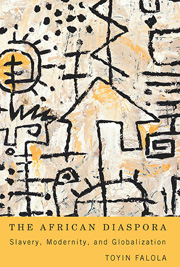Book contents
- Frontmatter
- Dedication
- Contents
- Preface and Acknowledgments
- Introduction: The Old and New African Diaspora
- Part 1 The Old Diaspora: Slavery and Identity Politics
- Part 2 An African Case Study: Yoruba Ethnicity in the Diaspora
- Part 3 The New Diaspora: Transnationalism and Globalization
- 8 Western Education and Transatlantic Connections
- 9 Africa in the Diaspora and the Diaspora in Africa: Toward an Integrated Body of Knowledge
- 10 Tanure Ojaide and Akin Ogundiran: Knowledge Circulation and the Diasporic Interface
- 11 Nollywood and the Creative World of Aderonke Adesola Adesanya: The African Impact on Global Cultures
- 12 Globalization and Contemporary Cultures
- Postscript: United States Foreign Policy on Africa in the Twenty-First Century
- Notes
- Bibliography
- Index
10 - Tanure Ojaide and Akin Ogundiran: Knowledge Circulation and the Diasporic Interface
from Part 3 - The New Diaspora: Transnationalism and Globalization
Published online by Cambridge University Press: 05 September 2013
- Frontmatter
- Dedication
- Contents
- Preface and Acknowledgments
- Introduction: The Old and New African Diaspora
- Part 1 The Old Diaspora: Slavery and Identity Politics
- Part 2 An African Case Study: Yoruba Ethnicity in the Diaspora
- Part 3 The New Diaspora: Transnationalism and Globalization
- 8 Western Education and Transatlantic Connections
- 9 Africa in the Diaspora and the Diaspora in Africa: Toward an Integrated Body of Knowledge
- 10 Tanure Ojaide and Akin Ogundiran: Knowledge Circulation and the Diasporic Interface
- 11 Nollywood and the Creative World of Aderonke Adesola Adesanya: The African Impact on Global Cultures
- 12 Globalization and Contemporary Cultures
- Postscript: United States Foreign Policy on Africa in the Twenty-First Century
- Notes
- Bibliography
- Index
Summary
The New African Diaspora
A distinctive category of African has emerged in the United States, Europe, and elsewhere. The label “new African diaspora” encompasses the era of migrations (postcolonial in Africa), instigating factors for migration (voluntary, but in the context of constrained or straightened circumstances in Africa), new forms of politics (post-civil rights era in the United States), new identities (transnational, dual/multiple citizenship), and issues around the role and relevance of migrants in Africa and the African diaspora (brain drain/gain/circulation). The label can also be considered synonymous with, as I use it, the terms “transnationalists” and “immigrants.” Some even refer to the groups of the new diaspora as “continental Africans” to mark them apart from African Americans. Among Africans in the United States, various identities are also emerging, such as Nigerian Americans, Senegalese Americans, and many more. Within each, there are also identities defined by religion, as with members of the broadly defined Islamic community or of the Nigeria-based Redeemed Christian Church of God.
The new African diaspora is transforming the American landscape. Its members are everywhere as migrant workers in diverse professions, including nurses, doctors, and pharmacists in hospitals and clinics; professors in universities; and engineers and researchers. They are everywhere as low-paid labor, including cab drivers, janitors, and maids. They are part of the commercial landscape as store owners, hairdressers, and barbers.
- Type
- Chapter
- Information
- The African DiasporaSlavery, Modernity, and Globalization, pp. 255 - 281Publisher: Boydell & BrewerPrint publication year: 2013



